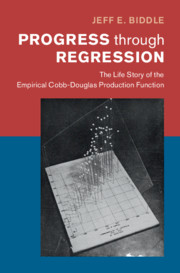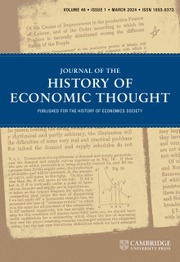Progress through Regression
The Cobb-Douglas regression, a statistical technique developed to estimate what economists called a 'production function', was introduced in the late 1920s. For several years, only economist Paul Douglas and a few collaborators used the technique, while vigorously defending it against numerous critics. By the 1950s, however, several economists beyond Douglas's circle were using the technique, and by the 1970s, Douglas's regression, and more sophisticated procedures inspired by it, had become standard parts of the empirical economist's toolkit. This volume is the story of the Cobb-Douglas regression from its introduction to its acceptance as general-purpose research tool. The story intersects with the histories of several important empirical research programs in twentieth century economics, and vividly portrays the challenges of empirical economic research during that era. Fundamentally, this work represents a case study of how a controversial, innovative research tool comes to be widely accepted by a community of scholars.
- Intersects the history of the Cobb-Douglas regression with the history of many previously under-studied empirical research programmes in twentieth century economics
- Comprehensive discussion of Cobb-Douglas regression in non-technical language
- Provides a fine-grained account of the actual research process in twentieth century empirical economics
Reviews & endorsements
'The Cobb-Douglas production function is the workhorse of modern economic theory. Debates regarding models that are built upon it go on all the time, yet seldom focus on Cobb-Douglas itself. Yet there were early debates about it, some of which could have lead in interesting directions. But the diffusion of the Cobb-Douglass function, especially in practical applications where it allowed attention to focus on what both theorists and applied scholars considered important, helped it to slide by any difficulties. Biddle’s protagonist is a worthy subject of study, opening our eyes to how modern economics actually works.' Ross B. Emmett, Arizona State University
'The history of economics has typically been a tale of ideas, ideologies, or economists. But tools have lives of their own. In a highly valuable contribution to understanding the practices of empirical economics, Jeff Biddle told the life story of one of the most productive tools in the economist’s workshop - the Cobb-Douglas production function. This book should interest not only the historian of economics, but every empirical economist as well.' Kevin Hoover, Duke University
'If the history of twentieth century economics is better characterized, not as a history of economic ideas, but as a history of tools and techniques - which I believe it should be - then Biddle’s history of the Cobb-Douglas production function is a highly relevant contribution. By taking on one of the most central tools of twentieth century economics, this book helps us gain a better understanding of how economics became an engineering science. Biddle’s focus on a broadly used tool gives a much more realistic history of modern economics.' Marcel Boumans, Utrecht University
'The history of applied economics and applied econometrics has not received as much attention as it deserves. This new book, which focuses on the history of an extremely widely used function, is a welcome addition to the literature, introducing us to episodes that deserve to be better known. The notion that economists welcomed the function, despite its flaws, because they wanted to believe it is fascinating.' Roger Backhouse, Birmingham Business School
‘… illustrates the usefulness of the biography of a scientific object to tell a history that expands beyond any single person or group … a commendable history that such an important technique deserves.’ Matthew T. Panhans, The European Journal of the History of Economic Thought
‘Biddle’s essay is a first-class historical account of a fascinating story. He does not make the case for or against the Cobb-Douglas function of production. By uncovering and explaining so clearly the difficulties and limitations, as well as the successes of the Cobb-Douglas regression, Progress through Regression is indispensable reading.’ Amanar Akhabbar, History of Economic Ideas
‘… a clearly told story of a theory and its implementation from its first proposal as a log-linear empirical relation linking out-puts to inputs by Charles Cobb and Paul Douglas (1928), resulting in a plethora of highly critical, constructive, and supportive reactions, through to its acceptance as a substantive production function relationship in a wide range of research areas. The developments, and the continued criticisms and responses, are carefully discussed, building on extensive archival research.’ David F. Hendry, HOPE
‘Jeff E. Biddle has produced a remarkable book on the history of regression studies on the Cobb-Douglas production function.' Aiko Ikeo, Erasmus Journal for Philosophy and Economics
Product details
November 2020Adobe eBook Reader
9781108676656
0 pages
This ISBN is for an eBook version which is distributed on our behalf by a third party.
Table of Contents
- Part I. Paul Douglas and his Regression, 1927-1948:
- 1. The Origins of Douglas's Production Function Research Program and his Initial Time Series Studies
- 2. The Douglas-Mendershausen Debate and the Cross Section Studies
- 3. Theoretical and Econometric Challenges of the Early 1940s, and Douglas's Final Word
- Part II. The Diffusion of the Cobb-Douglas Regression:
- 4. Three Important Developments in the Life of the Cobb-Douglas Regression, 1952-1961
- 5. The Cobb-Douglas Regression in Agricultural Economics, 1944-1965
- 6. The Cobb-Douglas Regression as a Tool for Measuring and Explaining Economic Growth
- Part III. Conclusion
- 7. On the Success of the Cobb-Douglas Regression
- References
- Index.





